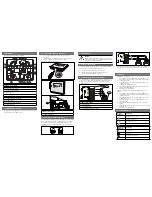
15
IMPORTANT!
This unit is NOT suitable as a smoke alarm, or to detect
other gases. This device is not suitable for installation in
a hazardous, as defined in the National Electrical Code.
If you call a qualified service technician (such as a
licensed heating contractor, utility service technician or
fuel provider) to inspect your home for possible sources
of CO, tell the technician what might have caused alarm.
Do not restart these appliances until the problem is
corrected. Request service for as soon as possible, like
today.
Please be aware that some service technicians may
charge a fee to inspect your home, even if the source of
CO is not found. You may wish to find out if you will be
charged for the service and the amount of the fee before
you request service. Some public utilities do not charge
for inspection. Some service technicians do not charge if
you purchased your appliance from them. To know for
sure, you need to ask before the technician comes to
your home. Repair work or replacement of appliances
may be necessary to fix the problem that is creating the
CO in your home. Remember, a CO Alarm can only
warn you of the presence of CO, it does not prevent
CO from occurring, nor can it solve an existing CO
problem.
Because you've provided ventilation by leaving your
windows and doors open, the CO buildup may have
dissipated by the time help responds. Although your
problem may appear to be temporarily solved, it's crucial
that the source of the CO is determined and appropriate
repairs are made.



































